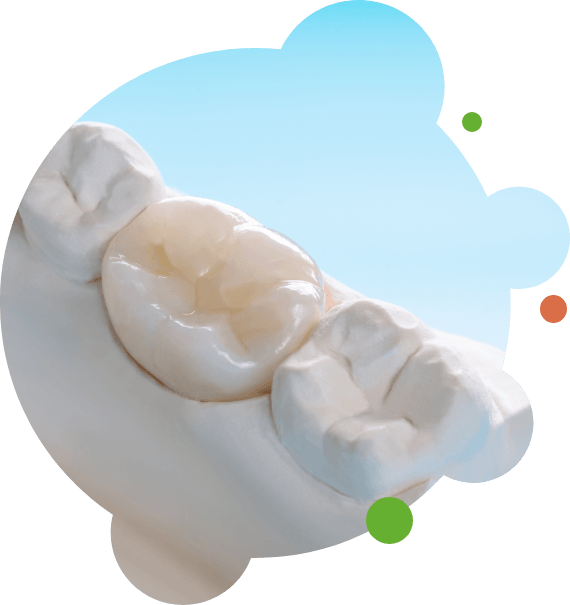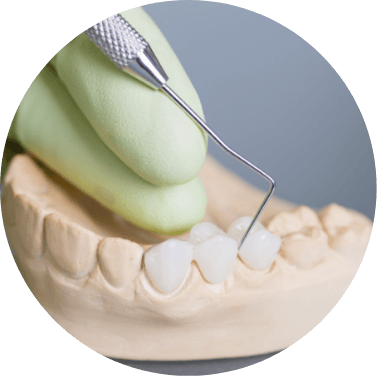Dental Crowns Plano
How We Make Your Tooth Good as New
If you only have a small cavity, then a tooth-colored filling is often enough to fully repair it. However, a tooth with a significant cavity might require something more. Dr. Sam Antoon often recommends a dental crown in this situation. Dental crowns in Plano, TX, are an incredibly versatile solution that can restore the structure and function of damaged or decayed teeth, all while looking 100% natural. If you have a broken or infected tooth that is making it hard to smile or eat, call our team at Antoon Family Dental today to learn more about how we make your smile as good as new with dental crowns!
Why Choose Antoon Family Dental For Dental Crowns?
- Digital X-Rays for Enhanced Imaging
- We Partner with Patients to Create Custom Treatment Plans
- In-Office Membership Plan for Uninsured Patients
What Is a Dental Crown?

You can think of a dental crown as a sort of “cap” for a tooth. While fillings only replace a small area of lost tooth enamel, crowns cover up the entire section of the tooth that is visible above the gumline. Each crown is fully personalized to meet the patient’s unique needs and blend in with the surrounding teeth. Once the dental crown process is complete, the crowned tooth should essentially look and feel just like any other tooth.
Dr. Antoon will usually recommend a dental crown for a tooth that:
- Has been decayed or weakened to the point that no other restorative solution will fix it
- Needs to be protected after undergoing root canal treatment
- Was severely injured and needs to be repaired
- Is badly stained or discolored and will not respond to teeth whitening
The Dental Crown Process

In most cases, getting a dental crown takes two appointments with your dentist in Plano. The first of these visits involves the preparation of your tooth. Dr. Antoon will either build up the tooth structure or remove a thin layer of enamel; otherwise, the restoration would look and feel unnatural. After the tooth is prepared, our team captures impressions of the tooth and sends them to a trusted dental lab.
While the lab technicians begin crafting your crown to our exact specifications, you’ll wear a temporary crown for a few weeks to protect the tooth. Once the crown is ready, you’ll return to our office. We’ll make any last-minute adjustments to ensure the crown feels great. Then, we’ll use a special cement to bond the crown to your tooth.
The Benefits of Getting a Dental Crown

By placing a dental crown, we can protect a tooth from future damage that would otherwise require it to be extracted. There are all sorts of problems that can arise from missing a tooth – including the cost of replacing it – so it’s in your best interest to retain the tooth for as long as possible.
Fortunately, that’s pretty easy with dental crowns. As long as you take good care of your crown, it can last up to 10 or 15 years. Thanks to the durable yet lifelike materials we use, our dental crowns in Plano have a remarkably high success rate.
Understanding the Cost of Dental Crowns

While you may want dental crowns, you may worry about their price. Fair enough – these dental caps can’t help if they exceed your budget. Truthfully, though, the cost of dental crowns varies from patient to patient. That means you’ll need to consult Dr. Antoon for an exact estimate. Once you have, though, we’ll work to make your care affordable. Our team will even walk you through crown price factors and payment options. If you’d like to learn more, just keep reading for the relevant details.
Factors That Affect the Cost of Dental Crowns

At the initial consultation, Dr. Antoon will perform an oral exam. This step allows him to assess factors that affect crown cost. These things include the following:
- Damage Severity – Based on the severity of tooth damage, a crown can cost more or less. For example, a pearly white with minimal injuries may only need a cap. With severe damage, though, the tooth may require preliminary work (root canal treatment, etc.). A crown will cost more in the latter case.
- Crown Material – Metal crowns are typically cheaper. Meanwhile, those made of porcelain and ceramic are pricier.
- Crown Processing – When traditionally milled by a lab, a dental crown isn’t quite as expensive. In contrast, crowns created with same-day CEREC technology are pricier.
As we consider these factors, remember that cheap crowns aren’t ideal. Good oral health depends on high-quality treatment, which often charges more. Therefore, try to get a stable crown that’s effective and long-lasting.
Does Dental Insurance Cover Dental Crowns?

Fortunately, dental insurance typically does cover dental crowns. After all, most plan providers consider crown placement a major procedure. Many policies thus offer partial coverage up to 50% of the treatment cost.
That said, exceptions to this principle do exist. There’s always a chance your plan doesn’t cover crowns. Alternatively, its coverage may involve special rules. It’s a good idea, then, to confirm your benefits before pursuing treatment. Our office can even help with that process.
Other Options for Making Dental Crowns Affordable
Of course, insurance isn’t the only way to make crowns affordable. Other options exist, with helpful payment options being the best among them. These can make even an expensive crown budget-friendly.
For instance, look at our own Antoon Family Dental. We happen to offer:
- In-House Discount Plans – By paying a low annual fee, our office will grant you significant discounts on dental crown treatment.
- Flexible Financing – Our practice works with CareCredit – a reputable third-party financier. Through them, you could pay for a crown with low-interest, monthly installments.
As you can see, a crown can be functional and affordable. So, get more crown financing facts by booking a consultation with our office today!
Dental Crown FAQs
Will a dental crown look natural?
A crown covers the entire surface of a tooth above the gumline. When envisioning the restoration, you may picture a silver cap covering a tooth. Although crowns were typically made of metal, modern restorations are made of porcelain to look like real teeth. Your dentist will craft your crown to match the appearance of your real teeth to blend in seamlessly. No one will be able to tell it’s not a natural part of your smile.
How long will my crown last?
While modern crowns are metal-free, they are equally durable. The average lifespan of a crown is about 10 years; however, it’s not unusual for them to last for decades with the proper maintenance. You can ensure your crown lasts for years by brushing, flossing, and using a daily mouth rinse. Your dentist will recommend avoiding hard, sticky, or chewy foods. It’s also important to protect your crown from damage by not using your teeth as tools and keeping inedible objects out of your mouth. Don’t forget to visit your dentist at least twice a year for a cleaning and checkup.
How much does a dental crown cost?
There’s no flat fee for a dental crown because multiple factors affect their cost, such as preparatory treatments, the size of your tooth, and the materials used. After examining your mouth and designing a customized treatment, we’ll provide you with an estimate and explain the fees associated with your plan. We strive to keep the procedure within everyone’s budget, which is why we accept various payment methods, like third-party financing. You can pay for your restoration in monthly installments based on your credit approval.
Can I use my dental insurance to pay for my crown?
Generally, crowns are covered under dental insurance plans; however, there can be situations where they aren’t. A crown offers both restorative and cosmetic benefits. If the restoration is only needed for elective reasons, such as to hide dark discoloration, your insurance may not cover the cost. If the crown is deemed necessary for your oral health, you can use your annual allowance to offset the cost. Although every policy differs, your coverage can pay up to 80% of the cost after reaching your deductible. We know dental insurance is confusing, but we are here to help. A member of our team will work on your behalf with your dental insurance by filing the required claim forms, so you have one less thing to worry about. They’ll explain how your coverage is being used for your treatment, and if there’s any out-of-pocket expense.
Are dental crowns permanent?
While dental crowns are not technically permanent, they are long-term restorative solutions that can last for fifteen years or more before needing replacement if they receive excellent care. However, the procedure that prepares a tooth to receive a crown is irreversible since tooth enamel cannot grow back after being removed, so the treated tooth will need to wear a restoration for protection from then on. Dental crowns can allow a compromised tooth to last longer and work better than it would if it was left untreated, and you can keep your appliance in great shape by practicing excellent oral hygiene, visiting our office in Plano regularly, making smart eating decisions, and refraining from using your teeth to open packages.
Does my dental crown need to be replaced?
While only a qualified dentist such as Dr. Antoon can determine if your crown needs to be replaced, you may notice a few signs that say you are ready for a new appliance. These include:
- Pain: Discomfort around a dental crown may indicate an infection in the tooth wearing it, which means that the appliance must be removed so the decay can be resolved. While it may be possible to simply put your crown back in place afterward, a new appliance may be necessary in other cases.
- Instability: Your dental crown wobbling about on your tooth may indicate that the cement holding it in place is compromised. Contact us if you notice this.
- Degraded appearance: Unsightly stains or cracks can be quite distracting from the beauty of your smile, so cosmetic issues can be reason enough to replace a crown.
- Dark line: If you have an older crown, you may notice a dark line forming around its base as the ceramic outer part separates from the metal piece anchoring it to the tooth. This is often due to age or wear and can be a sign that your crown needs replacement.
Do dental crowns get cavities?
While it is impossible for a dental crown to become infected, the tooth wearing it can still develop decay if it doesn’t receive proper care. A crowned tooth is just as likely to become infected as an uncrowned tooth, so it’s still important to brush and floss daily while using antibacterial mouthwash regularly after receiving your restoration. It’s also important to keep up with routine dental appointments at our Plano office so Dr. Antoon can remove plaque from along your gumline and the seam around your restoration, as these can be hard to reach with at-home oral hygiene methods.

